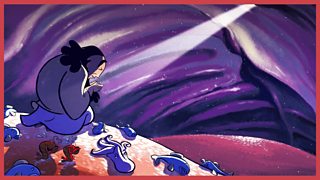Saying sorry: Jonah and the Whale
Themes: saying sorry; forgiveness; the importance of apologising; making up with friends after a falling out.
Summary: This assembly focuses on the importance of saying sorry and asking forgiveness. It includes the story of Jonah and the Whale from the Old Testament. The assembly can also be related to the Jewish festival of Yom Kippur - the 'Day of Atonement' - a day for asking forgiveness. The story of Jonah is popular at this time of year as an example of God's forgiveness for all those who truly repent. In 2019 Yom Kippur falls on 8th / 9th October.
Key links
-
![]()
Download / print the framework ready for use
-
![]()
Click on the image to display full-size
The video:

Jonah prayed - prayed for a second chance...
Jonah is told by God that he must go to Nineveh and tell the people living there to lead better lives or God will punish them. But Jonah doesn't want to do God's bidding to he jumps aboard a ship going in the opposite direction. God sends a great storm and the sailors throw Jonah overboard and he is promptly swallowed by the whale. Jonah spends three days in the whale's stomach praying to God for forgiveness and when a great fishy burp releases him he goes straight to Nineveh and delivers God's message.
Duration: 4' 33"
Final words: '...for delivering His message. "At last!"'
Story questions
What does God tell Jonah he must do?
God tells Jonah he must go to Nineveh and tell the people there to lead better lives
What does Jonah do instead of going to Nineveh?
He jumps on board a ship - going in the other direction!
What does Jonah tell the sailors they must do?
Throw him overboard - only that way will God end the storm
What does Jonah do while he is in the whale's tummy?
He spends three days praying to God - praying for a second chance to go to Nineveh
What does the King of Nineveh tell his people they must do?
He tells them to beg for forgiveness from God and try to lead good lives
Suggested framework
| Content | Guidance |
|---|---|
| 1. Entry music | There are plenty of songs to choose from about saying 'sorry' - for example 'They' by Jem or 'Sorry seems to be the hardest word' by Elton John. |
| 2. Introduction | Tell the assembly: 'Today we’re thinking about a word we use a lot - perhaps every day. Sometimes it can feel like a very hard word to say. It’s a word we use when we’ve done something wrong and we want to make things better again. Does anyone know what word I’m thinking of..?' [Gather responses.] Continue: 'Yes the word is 'sorry’. I wonder when you last said sorry to someone and why. Have a think about that now - and turn to the person next to you and tell them when it was. Saying sorry can be hard to do. And we’ll think more about that in a few minutes. But first we’re going to watch a story. It's a famous story from the bible about saying sorry and asking for forgiveness. Perhaps you’ll have heard of it. The story is called 'Jonah and the Whale'. |
| 3. The video | Play the video. The duration is 4' 33" and the final words are: '...for delivering His message. "At last!"' |
| 4. After the video | Use the Story questions to help the children recall the details of the story. |
| 5. Time to talk | Tell the assembly: 'In the story Jonah found it hard to say "sorry" to God at the start. Sometimes saying sorry can be really hard to do. Why do you think that is? (Steer the children towards an understanding that saying sorry is an acknowledgement of having done something wrong - of being less than perfect - and it’s not unusual to feel that way because our pride can get in the way). / Ask: ‘Why is it important that we say sorry when we’ve done something wrong?’ (Steer the children towards an understanding that saying sorry is a first step towards receiving forgiveness and making things better again). / Ask: ‘What can happen if we do something wrong - for example, if we do something to hurt another person - and we don’t say sorry?’ [Gather responses]. / Ask: ‘When we say sorry to someone that we’ve hurt what should the other person do in return? Should they simply forgive us?’ [Gather responses]. |
| 6. Opportunity to sing | Suggestions from Â鶹ԼÅÄ collections below. |
| 7. Opportunity to reflect | Ask the children to be quiet and say the following: ‘Saying sorry isn’t always easy. But it’s important when we’ve done something wrong that we understand that saying sorry is a first step to making things better again. It doesn’t mean that the other person has to forgive us there and then. Perhaps we’ll have to do other things as well so show we’re truly sorry. But saying ‘I’m sorry’ is a great first step to making things better again. Think to yourself about saying sorry… Is there someone you owe an apology..? If so, what will you do today to say sorry?' |
| 8. Opportunity for prayer | You could say the Lord's Prayer, which includes the words 'Forgive us our sins / As we forgive those who sin against us'. Or simply go with your usual form of address ('Dear God' etc) and: 'When we do wrong help us to say sorry / And when others say sorry to us for doing wrong, help us to forgive. / Thank you that we can make things better again. Amen.' |
Suggested songs
| Title | Collection | Significant words |
|---|---|---|
| 'While we live we learn' (Song video - see Related links) | All about our school, no 3 | 'While we live we learn / While we learn we grow' |
| 'Being a friend' (Song video - see Related links) | All about our school, no 8 | 'Being a friend is the best thing you can be' |


